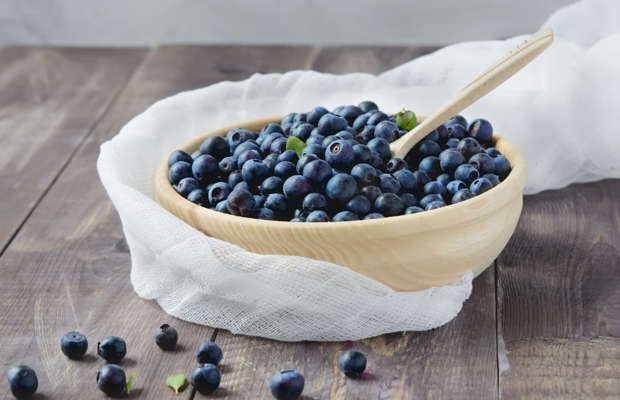
For all the benefits of fruit you should definitely not miss out on, it’s possible to go overboard.
Obviously, fruit is excellent for you. Different kinds offer important nutrients Americans are often skimping on, like potassium, fiber, vitamin C, and folate, Moore explains. “You get all of those in fruit, so you do want to eat them regularly,” she says. Plus, fruit = carbs which = energy.
The problem is that people sometimes view fruit as having “negative” or “free” calories, which definitely isn’t the case. This idea has become especially popular since Weight Watchers designated all fruits and vegetables as having zero “points,” the measurement the brand uses to track food intake. Weight Watchers decided to assign produce with zero points to encourage people to eat more of it, which is fitting, as most people don't get enough.
One common way people take in too much fruit, Moore says, is smoothies. Because they’re a “health food,” people may not realize that a single 16-ounce smoothie can pack 46 grams sugar into 220 calories. “Smoothies can absolutely be a healthy part of a diet, but I always encourage people to add in protein so the smoothie has more staying power, and to add vegetables to balance out the fruit,” Moore says. “That way you’re not getting so much sugar, especially in one meal.”
Adults should be getting around two cups of fresh fruit per day, depending on their sex and age, or two medium pieces, Abby Langer, R.D. and owner of Abby Langer Nutrition in Toronto, tells SELF. A smoothie might pack at least two times that much in a single cup.
![25 Popular Fruits—Ranked by Sugar Content!: By Olivia TarantinoExperts say we're basically shoveling sugar into our mouths by the spoonful, but what does that mean when it comes to eating sweet, antioxidant-rich fruits?You know it's in your soda, your protein bars, and your cereals. Heck, it's even lurking in your marinara sauces and salad dressings! We're talking about added sugar, of course. And this little ingredient is making a big impact on your waistline. The pervasiveness of added sweeteners in our diets is linked to an increased risk of obesity, diabetes, heart disease, and stroke. But in the epic rush to avoid sugar, many health-conscious consumers and low-carb dieters are starting to cut back on eating fruit. Superficially, it could make sense; if you were to look at certain fruits' nutrition labels, they may boast over 20 grams of the sweet stuff. But this sugar isn't the same as the kind that's used in your ice cream. Isabel Smith, MS, RD, CDN, founder of Isabel Smith Nutrition, and New York City-based celebrity dietitian and fitness expert, weighs in:]() 25 Popular Fruits—Ranked by Sugar Content!
25 Popular Fruits—Ranked by Sugar Content!
Therein lies the rub: When it comes down to it, sugar is sugar.
“People have the impression that fruit is so much healthier than a chocolate bar, so they blow the doors off with oranges,” Langer says. “Even though it’s natural, when you consume fruit, your body treats it like any other sugar.”
Of course, there are some big bonuses if you decide on fruit for dessert instead of a treat with added sugar: “The sugar in fruit comes with a side of fiber, so it’s absorbed less rapidly into your bloodstream. And fruit has more going for it than a Snickers bar in terms of vitamins, minerals, and antioxidants,” Langer says.
But it’s possible to eat too much of anything, especially if you’re doing it mindlessly, eating emotionally, or going all out to prevent yourself from eating something else. Eating way too much fruit can lead bloating, thanks to the sugar and fiber, she says. It can also cause fatigue from sugar crashes, weight gain or trouble losing weight, and over time, even health issues like heightened triglycerides (fat in the blood associated with how much sugar you eat) and high blood sugar levels, Langer says.
That’s not to say if you have a couple of extra pieces of fruit every day, you’ll wind up with these problems. The main people who have to worry about severe health issues from eating too much fruit are people like “fruitarians,” who see fruit as a way of life, literally, and get around 75 percent of their daily calorie intake from raw ones. (In 2013, Ashton Kutcher said following this diet when method acting for the movie jOBSgave him pancreas issues.)
But it’s something to be aware of, especially when it comes to issues like feeling tired all day, feeling bloated, and having a hard time losing weight.
Thankfully, none of the above means you need to be super-strict with your fruit intake.
Unless you have specific health needs or goals and have talked with a professional about your eating habits, there’s no reason to do things like slice bananas in half (“unless it’s a mega banana,” Langer says) or only choosing fruits with less sugar, like green apples or berries. “When it all comes down to it, I want people to eat fruit, period. I wouldn’t drill it down that much,” Langer says. So, sure, feel free to eat those low-sugar options—but don’t be afraid of fruits with higher sugar, like bananas, mangoes, and grapes.
Instead, enjoy all fruit mindfully, and try to combine it with protein and fat to further slow its absorption into your bloodstream. “There’s no reason to be afraid of fruit—it has so many health benefits,” Moore says. “You just want to make sure it’s a balanced approach.”
 7 Fruit Juices That Are Healthier Than You Thought
7 Fruit Juices That Are Healthier Than You Thought

source : Self (http://www.self.com/?mbid=synd_msn)
Related keywords : toronto, fatigue, getty images, food intake, consultant, weight watchers, marisa moore, ashton kutcher, atlanta, georgia, health food, abby langer, energy

0 Comments